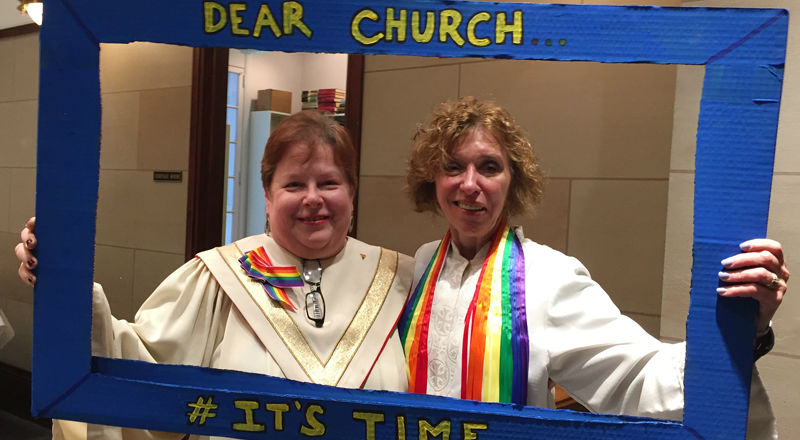Will Methodist Churches Bow to Jezebel’s Seduction Next Week?
“It’s time,” said the Rev. A. Wendy Witt during Sunday services at First United Methodist Church at the Chicago Temple.
Time to open the doors of the church to lesbian, gay, bisexual and transgender people, that is.
First United Methodist is one of the more than 750 congregations within the United Methodist Church that form the Reconciling Ministries Network, dedicated to including LGBT people in a denomination that bars them from ordination and does not allow its ministers to officiate same-sex weddings.
On Sunday, the network celebrated “It’s Time Sunday,” part of its “It’s Time” campaign intended to push the 7 million-member denomination to address the issue during its May 10-20 General Conference, a quadrennial meeting of Methodists from around the world.
More than 100 petitions relating to human sexuality have been submitted to the church’s top governing body. The denomination’s 864 elected delegates will consider them when they meet in Portland, Ore.
“It’s the perennial issue that will not go away, and for better or for worse, it’s the main battle flag issue between the liberal side of the church and the conservative side of the church,” said Mark Tooley, president of the Washington, D.C.-based Institute on Religion & Democracy.
Issues regarding sexuality have been discussed at every conference since the 1972 General Conference added language to the Book of Discipline calling homosexuality “incompatible with Christian teaching.”
Those discussions have been characterized by “lots of anguish and emotion and demonstration and disruption and sometimes police involvement,” according to Tooley.
But this year is different, said the Rev. Gil Caldwell, who was arrested at the General Conference 16 years ago while protesting the adoption of the sexuality provisions.
“The fact that same-sex marriage is now legal in the U.S.A. … that certainly ought to have an impact at a General Conference meeting after that fact,” Caldwell said.
Church research shows 46 percent of U.S. members agree with the church’s ban on same-sex marriage.
But crucially, the denomination is growing overseas and particularly in Africa, where homosexuality is banned in many countries. More than 40 percent of delegates will come to the General Conference from outside the U.S.
“There’s almost no doubt that if the United Methodist Church were a U.S.-only denomination, it would be where the other U.S.-only mainline Protestant denominations are on this issue,” Tooley said.
Tooley’s ecumenical Institute on Religion & Democracy, which describes itself as a voice for “Christian orthodoxy,” does not support a change, and he said he expects the General Conference to reaffirm its policies, possibly even strengthen them.
Still others — such as Peg Isaacson, chair of First United Methodist’s Reconciling Task Force — would be happy if the denomination simply allowed individual congregations to choose for themselves how to welcome gays.
All three positions are represented in the petitions delegates will consider at the General Conference, which will begin with a debate on how to debate the issue. The commission that oversees the gathering has proposed a group discernment process, nicknamed “Rule 44,” that would allow delegates to discuss contentious issues in small groups.
That way, Isaacson said, “people are looking at each other and talking to each other, rather than just testifying at a legislative committee.”
Among the plans to streamline all the legislation regarding sexuality is “The Simple Plan” supported by the Reconciling Ministries Network. That would change six paragraphs in the denomination’s Book of Discipline.
As the General Conference approaches, the “It’s Time” campaign was one of several drawing attention to what’s at stake in the debate.
Last week, the Rev. Val Rosenquist and retired Bishop Melvin Talbert co-officiated the wedding of a same-sex couple in North Carolina.
And this week, 15 clergy and clergy candidates in the New York Annual Conference came out in an open letter, saying, “We are lesbian, gay, bisexual, and queer clergy and candidates.” In another open letter, the chairs of the Baltimore-Washington Conference and New York Conference boards of ordained ministry called on other Methodist conferences to join them in no longer asking candidates about their sexual orientation.
On It’s Time Sunday, First United Methodist spent time in prayer for the bishops, delegates, staff and volunteers at the General Conference, as well as for “civility.” After the service, clergy and congregants such as Church Council Chair John Barker posed for photos inside a blue frame painted with the words, “Dear church … it’s time.”
Barker smiled alongside his wife, Kathy, and their 12-year-old daughter, Sophie. It was important to him for his family to take a stand, he said, echoing the theme of the day, “because it’s time for the church to change.”
“We support inclusion efforts and trust that the delegates to General Conference will hear God’s call to eliminate language that discriminates and live into God’s call that all means all,” he said. {eoa}
© 2016 Religion News Service. All rights reserved.














































